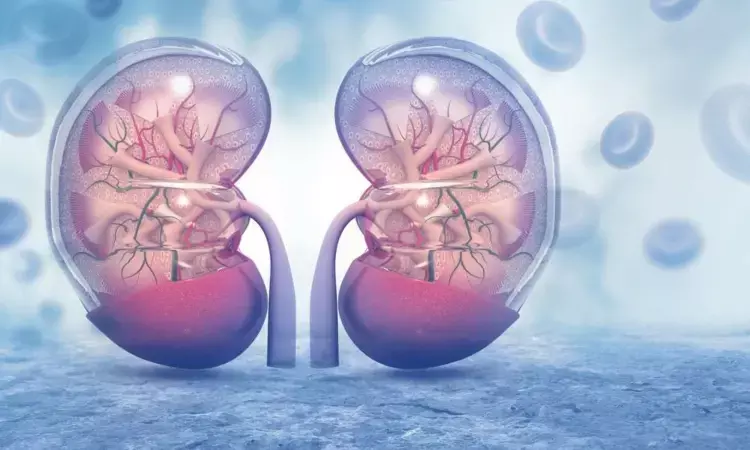- Home
- Medical news & Guidelines
- Anesthesiology
- Cardiology and CTVS
- Critical Care
- Dentistry
- Dermatology
- Diabetes and Endocrinology
- ENT
- Gastroenterology
- Medicine
- Nephrology
- Neurology
- Obstretics-Gynaecology
- Oncology
- Ophthalmology
- Orthopaedics
- Pediatrics-Neonatology
- Psychiatry
- Pulmonology
- Radiology
- Surgery
- Urology
- Laboratory Medicine
- Diet
- Nursing
- Paramedical
- Physiotherapy
- Health news
- Fact Check
- Bone Health Fact Check
- Brain Health Fact Check
- Cancer Related Fact Check
- Child Care Fact Check
- Dental and oral health fact check
- Diabetes and metabolic health fact check
- Diet and Nutrition Fact Check
- Eye and ENT Care Fact Check
- Fitness fact check
- Gut health fact check
- Heart health fact check
- Kidney health fact check
- Medical education fact check
- Men's health fact check
- Respiratory fact check
- Skin and hair care fact check
- Vaccine and Immunization fact check
- Women's health fact check
- AYUSH
- State News
- Andaman and Nicobar Islands
- Andhra Pradesh
- Arunachal Pradesh
- Assam
- Bihar
- Chandigarh
- Chattisgarh
- Dadra and Nagar Haveli
- Daman and Diu
- Delhi
- Goa
- Gujarat
- Haryana
- Himachal Pradesh
- Jammu & Kashmir
- Jharkhand
- Karnataka
- Kerala
- Ladakh
- Lakshadweep
- Madhya Pradesh
- Maharashtra
- Manipur
- Meghalaya
- Mizoram
- Nagaland
- Odisha
- Puducherry
- Punjab
- Rajasthan
- Sikkim
- Tamil Nadu
- Telangana
- Tripura
- Uttar Pradesh
- Uttrakhand
- West Bengal
- Medical Education
- Industry
Metabolic-associated fatty liver disease raises risk of end-stage renal disease

CHINA: According to research reported in Acta Diabetologica, individuals with biopsy-proven diabetic nephropathy are at an increased risk of incident end-stage renal disease if they have metabolic-associated fatty liver disease.
The prevalence of diabetes mellitus is rising globally as a result of increasing rates of obesity, metabolic syndrome, and westernization of lifestyle. At this time, it is unclear how much of an impact these developments will have on the global burden of diabetic kidney disease (DKD).
In patients with biopsy-confirmed diabetic nephropathy, the researchers sought to understand more about the connection between metabolic-associated fatty liver disease (MAFLD) and end-stage renal disease (ESRD).
Retrospective evaluations were performed on 316 patients who had biopsy-verified DN between January 2008 and December 2019. Propensity score matching (PSM) was used to correct the disparities of sex, age, baseline-estimated glomerular filtration rate, serum albumin, 24-hour urine protein, hemoglobin, and systolic blood pressure before comparing the risk of incident ESRD in 50 patients with MAFLD and 50 patients without MAFLD.
Key highlights of the study:
- In the PSM cohort, there were 19 ESRD outcome occurrences (19%) throughout the course of the median follow-up of three years.
- According to Kaplan-Meier curve analysis, individuals with MAFLD had significantly worse renal survival than patients without MAFLD (p = 0.021).
- After adjusting for six models, including demographic, clinical, and pathological characteristics as well as medication use at the time of renal biopsy, the hazard ratios (95% confidence intervals) for MAFLD were 3.12 (1.09-8.95, p = 0.035), 3.36 (1.09-10.43, p = 0.036), 3.66 (1.22-10.98, p = 0.021), 4.25 (1.34-13.45, p = 0.014), 3.11.
- patients with higher liver fibrosis scores had a higher risk of developing end-stage renal disease (ESRD) than those with lower liver fibrosis scores (p = 0.002).
The authors concluded that more investigation is required to determine whether MAFLD-targeting therapy enhances the prognosis of DN.
REFERENCE
Zou, Y., Zhao, L., Zhang, J. et al. Metabolic-associated fatty liver disease increases the risk of end-stage renal disease in patients with biopsy-confirmed diabetic nephropathy: a propensity-matched cohort study. Acta Diabetol (2022). https://doi.org/10.1007/s00592-022-01978-w
Dr Kamal Kant Kohli-MBBS, DTCD- a chest specialist with more than 30 years of practice and a flair for writing clinical articles, Dr Kamal Kant Kohli joined Medical Dialogues as a Chief Editor of Medical News. Besides writing articles, as an editor, he proofreads and verifies all the medical content published on Medical Dialogues including those coming from journals, studies,medical conferences,guidelines etc. Email: drkohli@medicaldialogues.in. Contact no. 011-43720751


